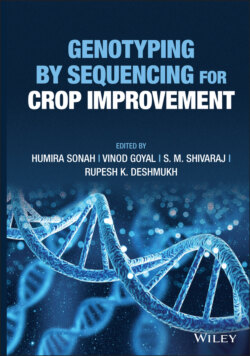Читать книгу Genotyping by Sequencing for Crop Improvement - Группа авторов - Страница 38
2.1 Introduction
ОглавлениеSingle‐nucleotide polymorphisms (SNPs) are the most common genetic variations present in the genome. These are the genetic loci where variation exists for a single nucleotide. Even for variation to be called as SNPs, it should be present in more than 1% of the individuals within a population. SNPs may be present as change or InDel of a single base which has originated mainly due to mutation or replication error. SNPs may fall within coding, noncoding as well as intergenic regions. Due to degeneracy of the genetic code, it is not necessary that SNPs within a coding region will change the amino acid sequence of the protein. A synonymous (often silent mutation) SNP is one in which both types of alleles result in the same polypeptide sequence, whereas nonsynonymous SNPs create a distinct polypeptide sequence. A nonsynonymous change further may be missense or nonsense. The missense mutation results in a different amino acid, while a nonsense mutation will result in a premature stop codon, ultimately forming a truncated peptide. SNPs that are not in protein‐coding regions may still affect the gene splicing, transcription factor binding resulting in a change in expression dynamics of the gene. As SNPs can occur throughout the genome, they offer a good advantage of genome‐wide coverage and higher frequency which assist high‐resolution mapping compared to other marker systems. Automated genotyping techniques, high reproducibility, easy cost of genotyping, presence within a genic region, and gel‐free methodology are some advantages of SNP which other markers lack. Besides several advantages, SNPs also offer certain disadvantages, such as detection of SNPs mostly requires sequencing of the DNA, high‐throughput analysis is required in postsequencing steps, also the SNP‐based genotyping experiments are always associated with high equipment cost.
In the last couple of years, the detection and exploitation of DNA polymorphisms with molecular markers and their utilization in breeding programs have transformed the pace and accuracy of these experiments. Ultimately, a complete shift from phenotype‐based breeding to molecular breeding has been evident. With the advancement of NGS technology, there is a rapid rise in the application of SNP‐based genotyping. The popularity of these programs depends on the cost incurred as well as the ease of their application. Also, these SNP‐based genotyping platforms offer many vital advantages over other marker systems like reproducibility, high marker density, automation, and many more. Many modern breeding techniques, such as genome‐wide association studies (GWAS) and genomic selection (GS), necessitate a large number of markers, which is difficult to achieve using PCR‐based markers like SSR.
